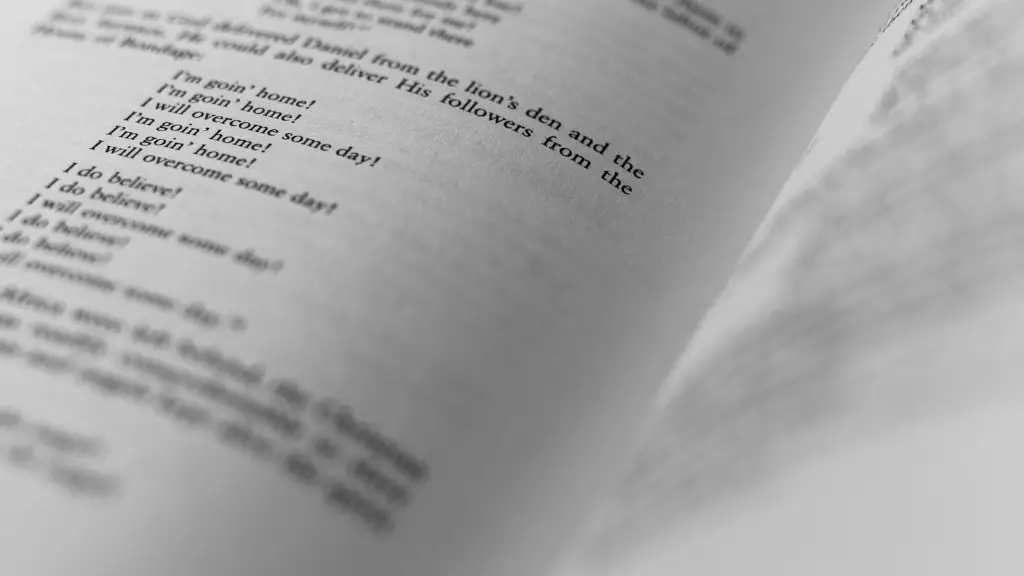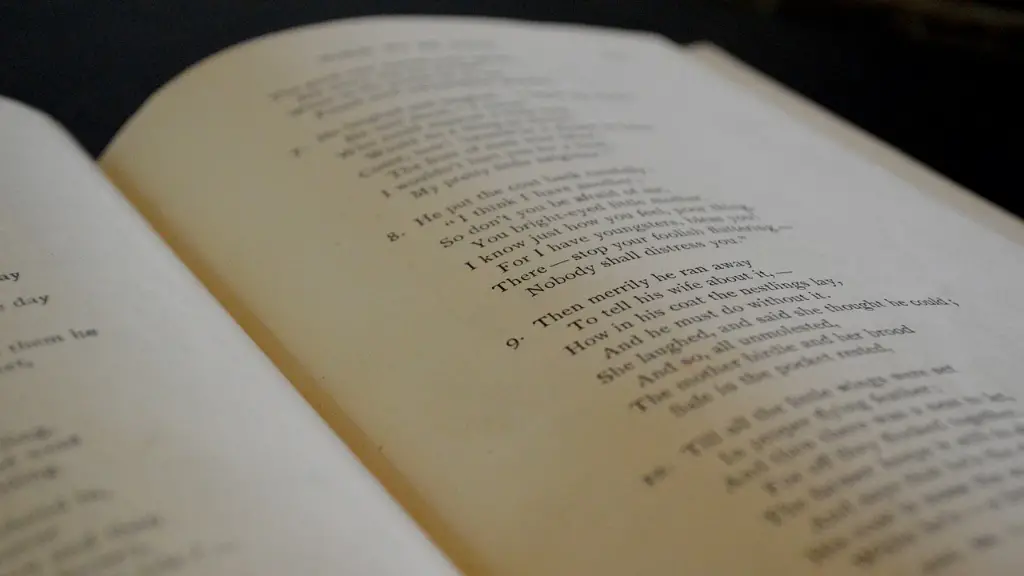Open form poetry is a style that does not attempt to adhere to conventional poetic structures or conventions. This type of poetry is often open-ended, which allows for greater freedom of expression and a more free-flowing piece of work. In contrast to other types of poetry, such as rhyming couplets, open form poetry does not rely on structure or order and does not attempt to adhere to an established form or genre. Open form poetry can encompass a variety of styles and techniques, from free verse to collage. It is a form of expression that allows the poet to create an individual and unique piece of art.
Open-form poetry often encourages the author to experiment with words, imagery and form, while still maintaining a sense of poetry. The author may choose to use repetition, sound devices, symbols, vivid descriptions, and other elements in their creations. This allows the writer to express their ideas in a unique and personal way. Open form poetry encourages the poet to explore their own interpretation of life, to find different angles of expression and a unique voice.
Open-form poetry is often thought of as challenging and unpredictable, as its form is not guided by any strict rules. This allows the poet to explore concepts, feelings, and ideas in a way that is not limited by established forms. It also allows the poet to express their thoughts in a way that is truly their own. Despite the lack of structure, the poet is still able to find meaning and purpose in their work, as it is an extension of their own individual perspective.
The beauty of open-form poetry is that there is no single “right” way to create a poem. This allows the writer to use different techniques and words to create something that is truly unique and personal to them. There are no restrictions or set rules for the form, which allows for complete freedom of expression. This is in stark contrast to other forms of poetry, which often rely on pre-determined rules and structure.
Open form poetry can also create a sense of intimacy between the writer and the audience. Since the poem is not pre-determined or constrained by traditional rules, the individual can create a piece of work that is completely their own and is more likely to be understood and appreciated by the reader. As the poet reveals themselves through the poem, their ideas, feelings, and thoughts can be shared in a more personal way that resonates with the reader and encourages them to connect with the poem.
The open form of poetry also offers a degree of flexibility for the poet. When writing a poem, the poet can choose to include various devices to achieve a desired emotional or expressionistic effect. The poet is free to explore different techniques, such as alliteration, repetition, and other sound devices to create a desired effect. The writer is then free to shape the poem to suit their own individual outlook and make it truly their own.
Advantages
Open form poetry can provide a great platform for expression and creativity. There are no constraints and rules, allowing the poet to explore their creative side and share their unique perspective on the world. This freedom is often seen as liberating, as the writer is no longer confined by traditional poetic forms. This also allows the poet to explore a variety of techniques and styles, as there are no restrictions on the type of words and metaphors used.
Open form poetry also offers a degree of flexibility when writing the poem. As the poet is not restricted by traditional rules and structures, they can choose to use any device to achieve a desired effect. This allows the poet to shape their poem in a way that is more meaningful to them. There is also the freedom to experiment, as the poet is free to explore a variety of techniques to create a personal and unique piece of work.
The lack of rules or structure also makes open form poetry easier to write. Unlike other forms of poetry, a poet does not have to worry about sticking to a certain structure or length of the poem. This allows the poet to focus more on the creative aspect of their work, rather than worrying about the technical aspects of structure and form.
Disadvantages
The open form of poetry may also present some challenges for the poet. The lack of structure often makes it difficult for the poet to create a coherent and meaningful piece of work. The lack of rules may also make it difficult for the poet to find a larger audience, as the poem may not be accessible to those who are not familiar with the style. Furthermore, Open form poetry may also be seen as less “professional” compared to traditional forms of poetry, which may also limit its audience.
Open form poetry also has the potential to be more abstract and obscure than traditional forms of poetry. Since there are fewer rules and structure, the poet may find it difficult to communicate their ideas clearly and effectively. The form may also lack the precision and focus of other forms, which could make the poem seem less meaningful to some readers.
The open form of poetry may also be difficult to analyze and evaluate. Since the poem is not bound by any structure or rules, it can be difficult to determine whether the poem is meaningful or effective. This can make it difficult to assess the poem’s value and may be seen as too “loose” of a form for some.
Examples
An example of open form poetry is the work of American poet Gertrude Stein. Stein experimented with various literary techniques and abandoned traditional forms of poetry. Her work often consisted of short, often unstructured prose poems that explored various social and political themes. Stein’s work was highly experimental, and she was often praised for her innovative use of language and imagery.
Another example of open form poetry is the work of American poet Kenneth Koch. Koch was known for his lengthy and often abstract poems, which explored a variety of themes and ideas. His works often consisted of random and often bizarre imagery and concepts, which made them both thought-provoking and often difficult to comprehend. Koch’s work was often praised for its creative and innovative use of language and imagery, as well as its ability to explore complex ideas.
Open form poetry can be found in many places, from literature to music. It is a form of expression that encourages the poet to explore their own unique voice. Open-form poetry can be both liberating and challenging, as the lack of structure allows for greater freedom of expression but may also make it difficult for the poet to create a meaningful and effective poem.
Influence
The influence of open form poetry can be seen in many areas of art and literature. Many poets and authors have used open form poetry to explore complex topics and ideas, as well as to express their own unique perspective. In addition, open form poetry has also been adopted by musicians, as the lack of structure allows for greater creativity and experimentation. Open form poetry is also often used in television and film, as it allows for a greater level of expression and abstraction.
Open form poetry has also had an influence on contemporary culture. In addition to being embraced by avant-garde artists and musicians, open form poetry has also become popular among young adults and teens. The lack of structure allows for a greater level of expression and freedom, which may be seen as appealing to younger generations. Additionally, the openness of open form poetry may also be seen as more relatable and accessible, as there are no set rules or structure that must be followed.
Overall, open form poetry has had a major influence on art, literature, and culture. Its lack of structure allows for greater freedom of expression and encourages experimentation and creativity. Open form poetry may be seen as more relatable and accessible, as there are no set rules or structure that must be followed. The influence of open form poetry can be seen in many areas of art and literature, and its popularity continues to grow.
Conclusion
Open form poetry is a style of poetry that eschews traditional forms and structure. It encourages the poet to experiment with language and imagery, while still maintaining a sense of poetry. Open-form poetry can be both liberating and challenging, as the lack of structure allows for greater freedom of expression but may also make it difficult for the poet to create a meaningful and effective poem. This style of poetry has had an influence on many areas of art and literature, and its popularity continues to grow.




